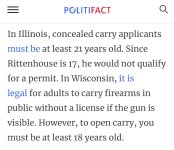But the judge said that Binger indicated that he knew Rittenhouse was not at that address back at his initial appearance and was likely living in a “safe house” for his own protection even back then. Thus, the judge questioned why it was suddenly a huge problem now, saying that many defendants fail to update their addresses with the court, and warrants are never issued for their arrest.
“You knew this at the time of the initial appearance,” said Schroeder. At another point, he said, “He was not put under condition of living at a specific address. That could have been done. The district attorney was aware of what he now refers to as flying the coop. There’s no change in circumstance there.”
The judge agreed Rittenhouse was in violation of that provision on updating the address but didn’t deem it serious enough to take punitive action. Just because the court tries to keep track of defendants’ addresses for the purpose of mailing them notices doesn’t mean that there’s a “restriction on place of abode,” he said. Schroeder said a restriction of where Rittenhouse can live could have been requested by the DA’s office at the initial appearance – but wasn’t.
On the warrant, he said, “I do not believe it’s possible to issue a warrant. I don’t think that would be lawful, no matter what feelings anyone has. I took an oath.” He disagreed with Binger’s statement that bail is a privilege, calling it a “right in the Constitution.”
Binger admitted he was not alleging such. “I am asking the court to increase the bond, however,” he added. Binger acknowledged that there is not the clear and convincing evidence necessary to seek bail revocation.
The judge did require that Rittenhouse submit his exact address – not a PO Box – to the court, but it will remain under seal. The judge refused to give the address to the DA’s office. He said he wanted to keep the case under seal to prevent additional violence, describing what happened in Kenosha as “ghastly.”
He said the number of defendants who fail to update their address with the court is 10% or maybe significantly more. “I’ve never jailed those people and never heard of another judge jailing those people,” said Schroeder.






